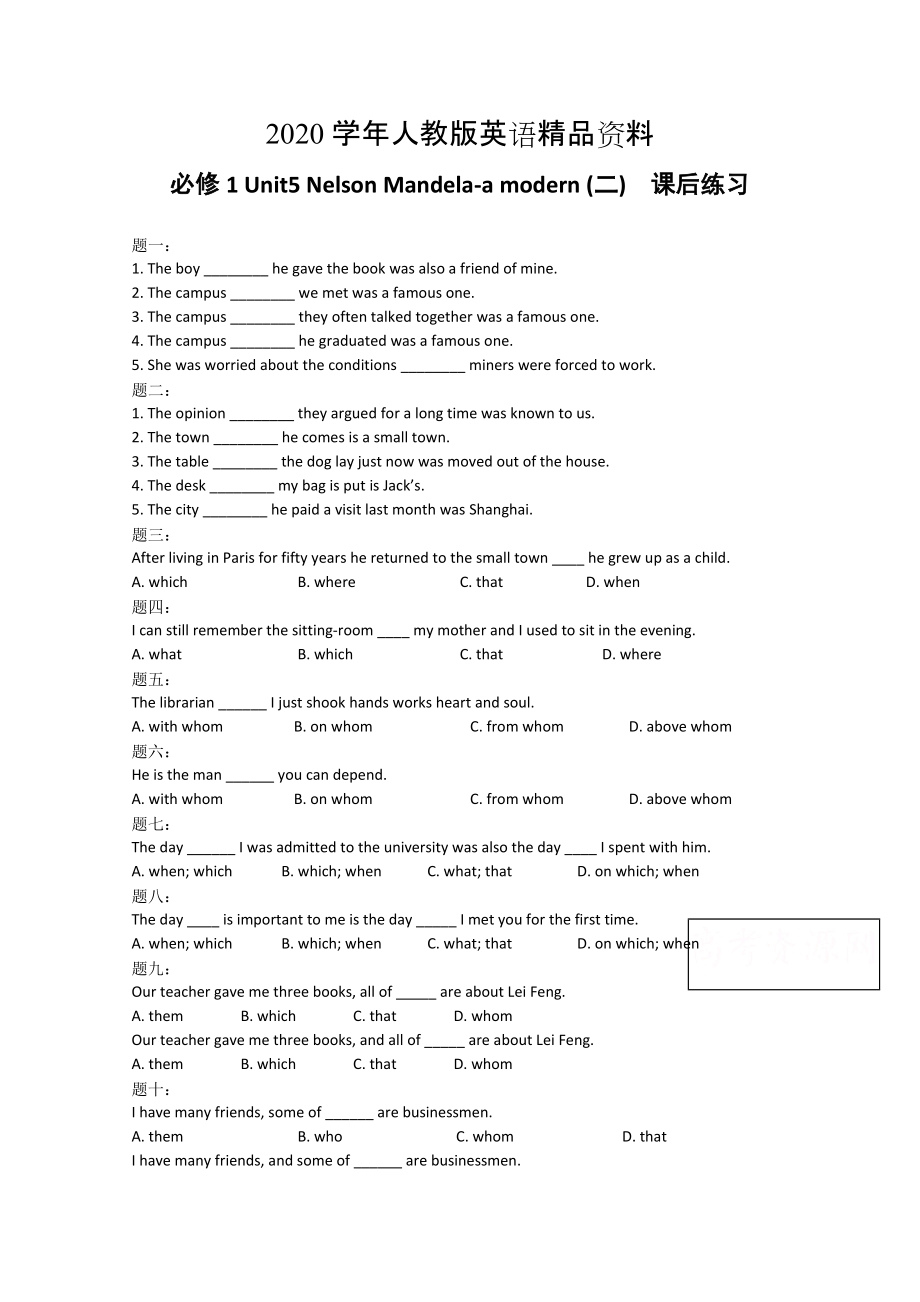《2020人教版英語(yǔ)必修一課后練習(xí):Unit5 Nelson Mandelaa modern 2含答案》由會(huì)員分享���,可在線閱讀��,更多相關(guān)《2020人教版英語(yǔ)必修一課后練習(xí):Unit5 Nelson Mandelaa modern 2含答案(5頁(yè)珍藏版)》請(qǐng)?jiān)谘b配圖網(wǎng)上搜索��。
1����、2020學(xué)年人教版英語(yǔ)精品資料
必修1 Unit5 Nelson Mandela-a modern (二) 課后練習(xí)
題一:
1. The boy ________ he gave the book was also a friend of mine.
2. The campus ________ we met was a famous one.
3. The campus ________ they often talked together was a famous one.
4. The campus ________ he graduated was a famo
2、us one.
5. She was worried about the conditions ________ miners were forced to work.
題二:
1. The opinion ________ they argued for a long time was known to us.
2. The town ________ he comes is a small town.
3. The table ________ the dog lay just now was moved out of the house.
4. The desk ______
3���、__ my bag is put is Jack’s.
5. The city ________ he paid a visit last month was Shanghai.
題三:
After living in Paris for fifty years he returned to the small town ____ he grew up as a child.
A. which B. where C. that D. when
題四:
I can still remember the sitting-room ____ my mot
4��、her and I used to sit in the evening.
A. what B. which C. that D. where
題五:
The librarian ______ I just shook hands works heart and soul.
A. with whom B. on whom C. from whom D. above whom
題六:
He is the man ______ you can depend.
A. with whom B. on who
5���、m C. from whom D. above whom
題七:
The day ______ I was admitted to the university was also the day ____ I spent with him.
A. when; which B. which; when C. what; that D. on which; when
題八:
The day ____ is important to me is the day _____ I met you for the first ti
6、me.
A. when; which B. which; when C. what; that D. on which; when
題九:
Our teacher gave me three books, all of _____ are about Lei Feng.
A. them B. which C. that D. whom
Our teacher gave me three books, and all of _____ are about Lei Feng.
A. them B. which
7��、 C. that D. whom
題十:
I have many friends, some of ______ are businessmen.
A. them B. who C. whom D. that
I have many friends, and some of ______ are businessmen.
A. them B. who C. that D. whom
題十一:
根據(jù)下面表格中的要點(diǎn)寫一篇有關(guān)美國(guó)殘疾女作家海倫·凱勒(H
8����、elen Keller)的短文。
參考詞匯: the deaf-mute聾啞人
1880年
出生于美國(guó)
19個(gè)月
因病喪失視力����、聽力及語(yǔ)言能力
7歲時(shí)
遇上女老師Miss Sullivan, 在其幫助下學(xué)會(huì)了讀、寫和講話����。
24歲時(shí)
以優(yōu)異成績(jī)畢業(yè)于Radcliffe學(xué)院
著作
The Story of My Life, Let Us Have Faith etc.
貢獻(xiàn)
傾注畢生精力為全世界的盲人和聾啞人服務(wù)
題十二:
以“居里夫人”為題寫一篇她的平生介紹。應(yīng)包括以下要點(diǎn):
1) 出生在1867年��,波蘭��。
2) 1891年去巴黎大學(xué)學(xué)
9、習(xí)��,學(xué)習(xí)刻苦�。
3) 1895年與皮埃爾·居里結(jié)婚,研究放射性物質(zhì)����。
4) 兩人發(fā)現(xiàn)了钚和鐳(polonium;radium)��,于1904年獲得諾貝爾物理學(xué)獎(jiǎng)���。
5) 1906年居里去世,她繼續(xù)研究��,1911年再度獲得諾貝爾化學(xué)獎(jiǎng)�。
必修1 Unit5 Nelson Mandela-a modern (二)
課后練習(xí)參考答案
題一: 1. to whom 2. on which 3.about which 4. from which 5. under which
10、
解析:
1. 根據(jù)定語(yǔ)從句中的動(dòng)詞gave�,以及短語(yǔ)give sth. to sb.可以確定介詞要用to���,而且先行詞是人����,在介詞的后面要用whom��。
2. 定語(yǔ)從句的引導(dǎo)詞在從句中作狀語(yǔ)��,根據(jù)先行詞campus可知如果表示在校園要用on��,先行詞是物��,所以要用on which��。
3. 根據(jù)定語(yǔ)從句中的動(dòng)詞talk以及短語(yǔ)talk about sth.可知��,要用about這個(gè)介詞��,先行詞是物��,所以要用about which��。
4. 根據(jù)定語(yǔ)從句中的動(dòng)詞graduated以及短語(yǔ)graduate from可知��,要用from which��。
5. 定語(yǔ)從句的引導(dǎo)詞在從句中作狀語(yǔ)��,根據(jù)先行詞c
11��、onditions可知如果表示在……情況下要用under��,先行詞是物��,所以要用under which��。
題二: 1. about which 2. from which 3. under which 4. on which 5. to which
解析:
1. 根據(jù)定語(yǔ)從句的先行詞以及定語(yǔ)從句中動(dòng)詞的搭配argue about sth.可知要用介詞about��,先行詞是物��,所以要用about which��。
2. 定語(yǔ)從句的引導(dǎo)詞在從句中作狀語(yǔ)��,根據(jù)先行詞town以及動(dòng)詞come的搭配可知要用from��,先行詞是物��,所以要用from which��。
3. 根據(jù)先行詞ta
12��、ble��,以及定語(yǔ)從句中的動(dòng)詞lay可知是躺在桌子下��,所以要用under這個(gè)介詞��,先行詞是物��,所以要用under which��。
4. 根據(jù)先行詞desk��,以及定語(yǔ)從句中的動(dòng)詞is put可知是被放在桌子上��,所以要用on這個(gè)介詞��,先行詞是物��,所以要用on which��。
5. 根據(jù)先行詞city��,以及定語(yǔ)從句中的動(dòng)詞paid a visit可知要用to這個(gè)介詞��,構(gòu)成pay a visit to這個(gè)短語(yǔ)��,先行詞是物��,所以要用to which��。
題三: B
解析:本句意為:在巴黎住了50年以后,他回到了他小時(shí)候生長(zhǎng)的小鎮(zhèn)��。因?yàn)橄刃性~the small town指地點(diǎn)��,且定語(yǔ)從句中缺狀語(yǔ)��,故應(yīng)
13��、選關(guān)系副詞where��,相當(dāng)于in which��。
題四: D
解析:本句意為:我仍然記得媽媽和我過(guò)去晚上坐的客廳��。先行詞是地點(diǎn)��,關(guān)系詞在定語(yǔ)從句中作狀語(yǔ)��,所以要用where��。
題五: A
解析:本句意為:剛才和我握手的那個(gè)圖書管理員全心全意地工作��。先行詞是人��,根據(jù)短語(yǔ)shake hands with可知要用with這個(gè)介詞��,先行詞是人��,所以要with whom��。
題六: B
解析:本句意為:他是你可以信賴的人��。根據(jù)定語(yǔ)從句的先行詞是人��,以及短語(yǔ)depend on可知��,此處要用on whom��。
題七: A
解析:本句意為:我被大學(xué)錄取的那一天也是我和他一起度過(guò)的
14��、那一天��。前面的先行詞是時(shí)間��,關(guān)系詞在從句中作狀語(yǔ)��,所以要用when��;后面的關(guān)系詞在從句中做spent的賓語(yǔ)��,所以要用that��、which或者省略來(lái)引導(dǎo)定語(yǔ)從句。
題八: B
解析:本句意為:對(duì)于我來(lái)說(shuō)重要的那一天就是我第一次遇到你的那一天��。前面的先行詞是時(shí)間��,關(guān)系詞在從句中做主語(yǔ)��,所以要用that或者which��;第二空先行詞是時(shí)間��,關(guān)系詞在從句中做狀語(yǔ)��,所以要用when來(lái)引導(dǎo)定語(yǔ)從句��。
題九: B; A
解析:
第一題中兩個(gè)句子沒(méi)有連接詞連接��,所以可知是定語(yǔ)從句��,先行詞是物��,所以要用which��;第二題中有and連接兩個(gè)句子��,所以是并列句��,要用them代指前面的復(fù)數(shù)名詞books
15��、��。
題十: C; A
解析:
第一題中兩個(gè)句子沒(méi)有連接詞連接��,所以可知是定語(yǔ)從句��,先行詞是人��,所以要用whom��;第二題中有and連接兩個(gè)句子��,所以是并列句��,要用them代指前面的復(fù)數(shù)名詞friends��。
題十一:
Born in 1880, Helen Keller is a well--known American woman writer with disabilities.
At the age of 19 months, it was unexpected that Helen Keller was robbed by illness of sight and h
16��、earing, which caused her to become mute. Fortunately, when Helen was 7 years old, she met Miss Sullivan, who is very kind-hearted and helpful. Miss Sullivan managed to help Helen learn to read, write and talk. With the help of Miss Sullivan, Helen went to study at Radcliff College and graduated from
17��、 it with honors at the age of 24. During her whole life, Helen wrote some excellent books, such as The Story of My Life and Let Us Have Faith. Besides, she devoted all her lifetime to working for the blind and the deaf-mute both at home and abroad.
All in all, Helen’s example has encouraged a lot o
18��、f people whether they are normal or disabled.
題十二:
Madame Curie
Madame Curie is a French professor of physics. She was born in Poland in 1867. In 1891, she managed to go to study in Paris University. When she was studying in Paris, she lived a poor life, but she worked very hard. In 1895, she
19��、got married to Pierre Curie, also a physics professor, and then they worked together on the research into radioactive matter. After long and hard work, they discovered two kinds of radioactive matter--- polonium and radium. In 1904, she together with her husband received a Nobel Prize for Physics. After Mr. Curie passed away in 1906, she went on with her research. She achieved a lot. And she obtained a second Nobel Prize for Chemistry in 1911.
 2020人教版英語(yǔ)必修一課后練習(xí):Unit5 Nelson Mandelaa modern 2含答案
2020人教版英語(yǔ)必修一課后練習(xí):Unit5 Nelson Mandelaa modern 2含答案

